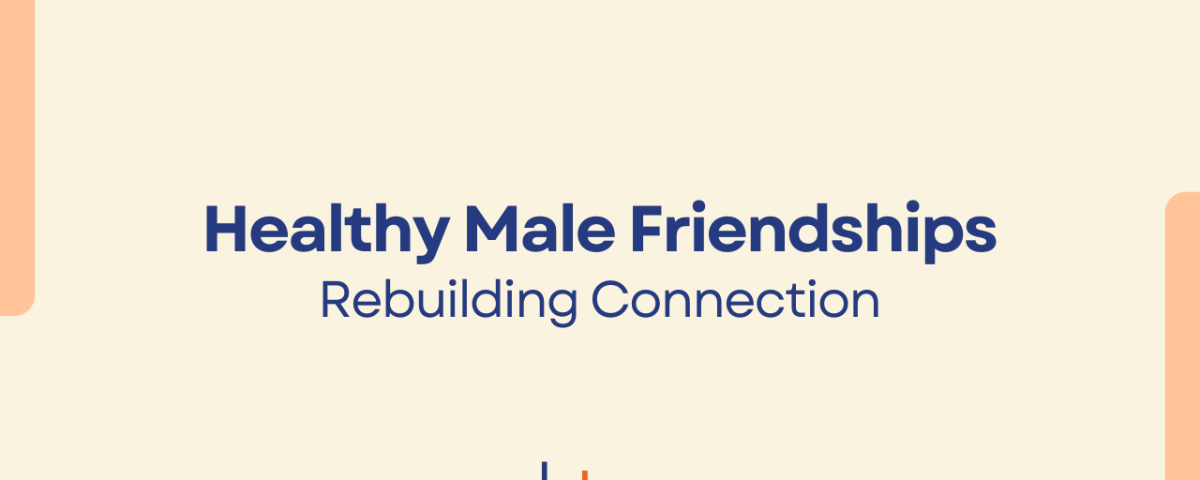Why Male Friendships Matter & How Men Can Rebuild Genuine Connection
Why Male Friendships Matter & How to Rebuild Connection
Friendship is one of the strongest protective factors for mental health and wellbeing — yet many men find it surprisingly difficult to build and maintain deep, supportive friendships in adulthood. While women are often encouraged to nurture emotional bonds from an early age, men are frequently socialised to value independence, stoicism, and self-reliance. That can leave even socially active men feeling emotionally isolated.
This blog explores why male friendships are so important, the common obstacles that get in the way, and practical steps men can take to rebuild connection and develop meaningful friendships.
Why Male Friendships Matter
Humans are wired for connection. Strong social bonds reduce the risk of depression, anxiety, substance misuse, and even certain physical health concerns such as heart disease. For men in particular, having meaningful friendships provides a crucial counterbalance to social expectations that you cope alone or only lean on romantic relationships for emotional support.
Research shows that men are more likely than women to report loneliness even if they have plenty of social contacts. That suggests while they may have acquaintances or casual friends, they lack people they feel they can open up to when life gets hard. This emotional gap doesn’t just affect mental wellbeing — it limits belonging, purpose, and day-to-day support.
The Barriers to Male Connection
- Social Conditioning
From childhood onwards, many boys hear “don’t cry,” “man up,” or “be tough.” Over time, these messages discourage emotional expression and associate vulnerability with weakness. - Cultural Norms of Masculinity
Masculine ideals such as independence, achievement, and stoicism can feel protective — but they may also create distance. Some men worry that seeking emotional support makes them appear less capable. - Life Transitions
Major changes like career moves, relocation, or becoming a parent can disrupt social networks. Men often let friendships fade during transitions rather than actively nurturing them. - Narrow Definitions of Friendship
Many male friendships centre around shared activities — sport, watching games, hobbies. While these are meaningful, they don’t always allow for emotional depth. Without opportunities to talk about feelings, friendships may remain surface-level.
What Healthy Male Friendships Look Like
Healthy emotional bonds between men don’t reject masculinity — they expand it. Key signs include:
- Mutual support — friends who check in, show up, and listen without judgement
- Emotional honesty — a safe space to share fears, struggles, and joys
- Balanced giving and receiving — both people feel valued and supported
- Respect for boundaries — acknowledging each other’s individuality and needs
- Celebrating success — genuine pride in each other rather than competition
- Play and fun — laughter, shared experiences, joy
These aren’t just ideals — they are skills that can be developed with intention and practice.
How Men Can Foster Closer Friendships
Here are practical steps to deepen male friendships:
- Reach Out Intentionally
Don’t wait for someone else to initiate. Message an old friend, suggest catching up, or invite someone for a coffee or activity. Small gestures show you care. - Start with Small Vulnerabilities
You don’t need to dive into your deepest fears right away. Begin with minor disclosures — stress at work, uncertainty about a project, or just admitting you’re tired. That opens the door for deeper conversations later. - Listen with Presence
Put your phone aside, maintain eye contact, and resist the urge to always “fix”. Often our friends just need to be heard. - Create Rituals of Connection
Whether it’s a weekly sport meet-up, monthly dinner, or regular phone catch-ups, consistent connection helps sustain relationships. - Challenge Old Beliefs about Masculinity
Reflect on the messages you’ve internalised about being a man. Ask whether they help you connect or keep you distant. Give yourself permission to redefine masculinity to include kindness, openness, and emotional strength. - Seek Shared Growth
Encourage each other’s personal growth — perhaps trying a workshop together, supporting healthier habits, or holding each other accountable to new goals.
The Role of Therapy and Professional Support
If you’ve experienced past betrayal, trust issues, or emotional avoidance, it can feel especially difficult to build close friendships. Therapy offers a safe space to explore those patterns and develop emotional skills.
Group therapy, men’s circles, or community peer-support groups can also help you practise vulnerability and build connection with like-minded individuals.
A Hopeful Outlook
While many men struggle to find deep emotional connection, that doesn’t mean hope is lost. Every time a man reaches out, opens up a little, or accepts support, he contributes to changing what healthy male friendships can be.
These relationships don’t just benefit the individual — they ripple outwards to families, communities, and society. By modelling vulnerability, empathy, and true loyalty, men can help shift cultural norms.
Healthy male friendships are rooted in honesty, mutual care, and joy. They remind us that life is not meant to be lived alone.
Call to Action
If you or someone you know is struggling with loneliness, emotional disconnection, or building close relationships, consider reaching out for support. At CBT Professionals, our team of psychologists is here to help you explore patterns, heal emotional blocks, and build stronger, more connected relationships.
Find out more about our services for men’s mental health on our website: Men’s Mental Health Services – CBT Professionals or book an appointment here: Book an Appointment.
THREE CONVENIENT LOCATIONS
MOUNT GRAVATT
Mt Gravatt Medical PrecinctSE 105, 1808 Logan Rd
Upper Mount Gravatt QLD 4122


